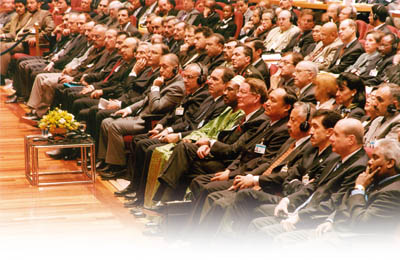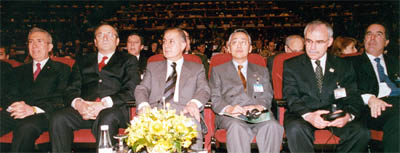Connect every village by year-end 2003!
 ITU Secretary-General tells Conference ITU Secretary-General tells Conference
 The third ITU World Telecommunication Development Conference (WTDC–02) ended on 27 March 2002 with 1150 delegates from 152 countries adopting the Istanbul Declaration and Action Plan to help bridge the digital divide. WTDC–02 was held at the Istanbul Conference and Exhibition Centre from 18 to 27 March 2002 and was attended by 394 government delegates, including representatives from 56 regulatory authorities, 45 operators, 23 scientific and industrial organizations and 22 regional and international organizations. The third ITU World Telecommunication Development Conference (WTDC–02) ended on 27 March 2002 with 1150 delegates from 152 countries adopting the Istanbul Declaration and Action Plan to help bridge the digital divide. WTDC–02 was held at the Istanbul Conference and Exhibition Centre from 18 to 27 March 2002 and was attended by 394 government delegates, including representatives from 56 regulatory authorities, 45 operators, 23 scientific and industrial organizations and 22 regional and international organizations.
To many at the Conference, bridging the digital divide means providing access to telecommunications and information and communication technologies (ICT) and promoting their use so that all segments of society can fully enjoy the opportunities of the much-publicized information society. The Conference reviewed current major policy issues and adopted a common vision and strategy for achieving a balanced telecommunication development, setting new goals and objectives for the next four years.
Conference opening
WTDC–02 was opened by ITU Secretary-General Yoshio Utsumi, in the presence of a number of top Turkish authorities including President Ahmet Necdet Sezer; the Minister of Transport and Communications, Oktay Vural; the Governor of Istanbul, Erol Çakir; the President of the Telecommunication Authority of Turkey, Fatih Mehmet Yurdal; the Deputy Under Secretary of Transport and Communications, Selçuk Coskun; and more than 30 ministers and several other dignitaries from around the world.
| |

From left to right: Erol Çakir, Governor of Istanbul; Oktay Vural, Turkey’s Minister of Transport and Communications; Ahmet Necdet Sezer, President of Turkey; Yoshio Utsumi, ITU Secretary-General; Fatih Mehmet Yurdal, President of the Telecommunications Authority of Turkey; and Roberto Blois, ITU Deputy Secretary-General
(ITU 020043)
|
Mr Utsumi set the tone with some tough questions. “Have we done enough for the development of telecommunications in
the world? Have the benefits started to flow to the hardy peasants toiling in the Himalayan ranges of Nepal, the tribes of Papua New Guinea, the Indians of Brazil, or the people of Africa?” The unfortunate answer is “no”, he said. “Even though we have made progress since the first WTDC was held in Buenos Aires in 1994, there was only one fixed telephone line for every 25 developing country citizens. By the time of the Valletta Conference in 1998, there was one line for every 15 citizens and now, in 2002, there is one fixed telephone line for every 10 citizens,” he pointed out. “The distance we have travelled is still smaller than the distance we have yet to cover. Some 83 countries still have a teledensity of below 10 lines for every 100 inhabitants; 29 countries still have a teledensity below one per cent. In the case of the Internet, 63 countries have less than one per cent.”
Mr Utsumi recalled that many initiatives had been taken to bridge the digital divide: from the Maitland Commission more than 15 years ago to the G8 Dot Force and the UN ICT Task Force. “There is no time to discuss again, in yet another committee... the need of the hour is to launch an offensive, on a war footing, to make sure that every village in the world is connected before the World Summit on the Information Society takes place”. He called on the public and private sectors to be driven by their common objectives rather than divided by their different views on how to achieve these goals.
Also speaking at the opening ceremony, Mr Vural said that the widening inequalities in access to information and
technology between industrialized and developing nations could be a source of tension. In his words: “To reap both the economic and social benefits of technological progress and to improve people’s quality of life, the information society must be based on the principles of equal opportunities, participation and integration of all. This can only happen if everybody has access to at least a basic set of the new services and applications offered by the information society.” He urged the United Nations, ITU and the wealthy nations, in particular the G-8 countries, to be more sensitive to these issues and to allocate more funds to narrow the digital divide as an important step in making the world a better and more peaceful place.
President Ahmet Necdet Sezer delivered the keynote address echoing the same sentiments. “One of the main challenges
the new telecommunication technologies create is that only certain countries and circles possess these technologies while the other countries are not benefiting from the information society and the opportunities it brings.” He told
participants that developing countries ought to pursue policies that enhance access to telecommunication services at affordable prices in order to mitigate the negative impact of these differences.
Fatih Yurdal was elected Chairman of the Conference, along with six vice-chairmen (see box on page 15 for details of
the presiding officers of the Conference).
At the first Plenary session of the Conference, Hamadoun I. Touré, Director of the ITU Telecommunication Development Bureau (BDT) highlighted the major achievements of the Valletta Action Plan adopted four years ago.
|